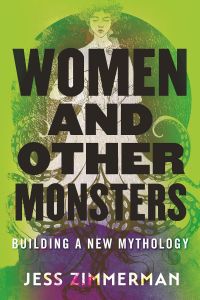On the endless possibilities of deviating from the norm.

I’ve been angry a lot lately. The country is or is not in the process of falling apart every second of every day, depending on whom you ask. (What doesn’t seem in doubt is that hateful, cruel people are infiltrating the government and doing untold harm across the spectrum.) In the last year, three of my closest family members have been battling cancer. And lately, my senior dog has started peeing all over the floor.
Granted, the pet problems are not on par with the decline of civilization, but events have certainly conspired to make me feel helpless and hopeless. With that in mind, I turned to Jess Zimmerman’s incomparable Women and Other Monsters: Building a New Mythology for a galvanizing dose of both escapism and real-world analysis.
“All the stories about monstrous women, about creatures who are too gross, too angry, too devious, too grasping, too smart for their own good, are stories told by men…What would Medusa say about the ugliness she first experienced as an unjust punishment, and then learned to use as a weapon? What happens when we free the Sphinx from the drama of Oedipus, and let her exist as something more than an obstacle to man?” Zimmerman inquires, adding heartbreakingly, “What was it like for the Sirens on their lonely rock, watching everyone who tried to love them drown?”
The Greek myths were conceived thousands of years ago, and it’s disheartening to realize that modern women still face some of the same challenges as their ancient predecessors. Yet Zimmerman makes clear that this realization can be part of a process of renewal and discovery — even transformation.
“If beauty is a thin spear of light surrounded by darkness,” she writes in dissecting Medusa’s backstory, “then what lives in the darkness must be either ghosts — inconsequential, invisible — or monsters. Something to be reviled or ignored.”
Perhaps, however, we should not revile, should not ignore either monsters or ghosts; perhaps they possess helpful perspectives we hadn’t considered. If Medusa is not simply a monster but also a once-mortal woman raped by Poseidon in Athena’s temple and penalized by Athena for her “transgression,” her rage becomes understandable.
What happens when we more deeply consider the motivations behind the myths we tell ourselves and other women? Who benefits (and who doesn’t) from a story in which the worst thing a person can be is so ugly she literally turns men to stone? And who decides where a story starts and stops?
Other women, or women-coded monsters, in Greek mythology represent other mortal sins. (Mortal for women, that is.) From a chapter on Charybdis, of Scylla and Charybdis fame, Zimmerman writes:
“Outsize hunger is the province of the monster, and for women, all hungers are outsize.”
On the Sirens, whose otherworldly songs lure sailors to their watery deaths, she offers:
“This is one of the great injustices perpetrated against women: we are blamed for our abuse, based on the same behaviors and self-presentation we are trained to use to keep ourselves pleasing and favored.”
And when examining the Harpies, who aspire to mete out justice but are perceived as freaks, Zimmerman concludes:
“[A]mbition is larger than the desire for material success or political clout, or even the desire for recognition in arts or sports or scholarship. To the patriarchy, even the wish to control our own bodies reads like ambition.”
The author’s incisive observations produced a curious disorientation in me. I still felt despair and panic, as well as some paralysis. But threads of rage were beginning to wend their way through these emotions, as well — rage, and determination. Oppressors have eternally feared women yet haven’t succeeded at conquering us. Perhaps our current shift toward a more monstrous feminism is, in fact, a component of our salvation.
Mariko Hewer is a freelance editor and writer as well as a nursery-school teacher. She is passionate about good books, good food, and good company. Find her occasional insights of varying quality on Twitter at @hapahaiku.

